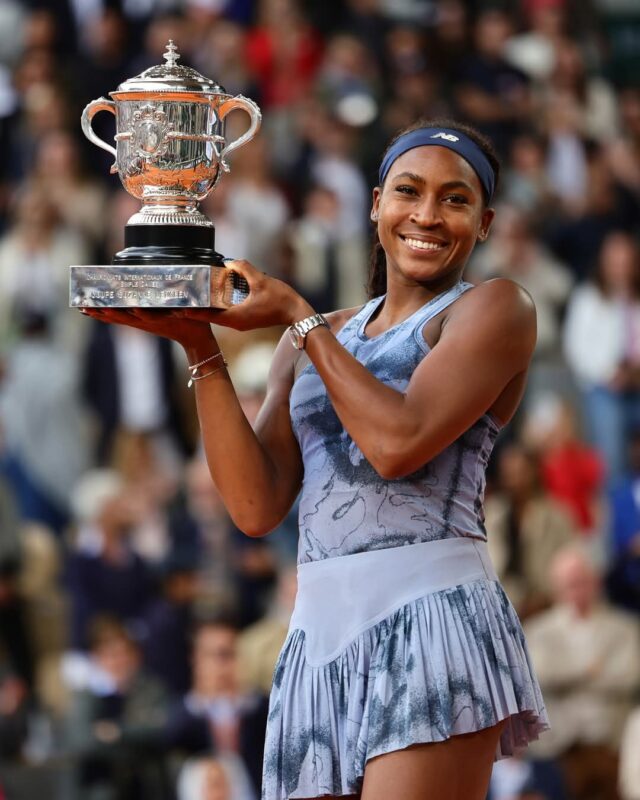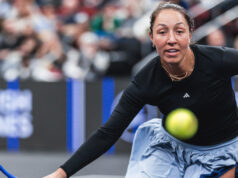PARIS — In a thrilling, wind-swept showdown at Roland-Garros, 21-year-old Coco Gauff captured her first French Open title—and her second Grand Slam overall—by defeating world No. 1 Aryna Sabalenka 6-7 (5), 6-2, 6-4 in an emotionally charged final that showcased resilience, grit, and the spirit of a champion.
“This is the one I’ve always dreamed about,” Gauff told the crowd, tears welling as she hoisted the trophy on Court Philippe-Chatrier. “I didn’t think I could pull this off.” Moments later, she quoted Tyler, the Creator: “If I ever told you I had a doubt inside me, I was lying.”
Gauff’s comeback win makes her the first American woman to win the French Open since Serena Williams in 2015—an achievement that sparked praise across the globe, including heartfelt messages from Barack and Michelle Obama. But for Gauff, the victory meant more than just personal glory.
“With everything happening in our country right now, I hope I gave people something to smile about,” she said. “Especially people who look like me—who may not always feel seen or supported. This win is for them too.”
A Final of Grit and Grace:
The clash between the world’s top two players was the first of its kind at the French Open since Serena Williams beat Maria Sharapova in 2013. And it lived up to its billing.
Sabalenka stormed out of the gates, taking a 4-1 lead in the first set and dominating early rallies with heavy hitting. But despite serving for the set twice, she struggled to close it out. Gauff, playing with poise beyond her years, clawed her way back with gutsy shot-making and mental tenacity, eventually losing a tight tiebreak 7-5.
What followed, however, was a turning point.
As gusting winds whipped around the clay, disrupting rhythm and precision, Gauff adjusted her tactics, mixing in drop shots and forcing errors. She broke Sabalenka early in the second set and never looked back, capitalizing on the Belarusian’s mounting frustration and 70 unforced errors throughout the match.
Sabalenka admitted afterward that the conditions rattled her. “The wind got in my head. I lost focus and started missing balls I usually make,” she said. “It wasn’t my best day.”
The Final Set: Nerves of Steel:
With the match leveled, Gauff struck first in the decider, breaking Sabalenka’s serve and moving up 3-1. Though Sabalenka managed to battle back and tie the score at 3-all, the American held firm, breaking once more to go ahead 4-3 and holding for 5-3.
Serving for the title at 5-4, Gauff faced break point—but once again, she steadied herself. On her second championship point, Sabalenka’s backhand drifted wide, and Gauff dropped to the clay, overwhelmed with emotion and disbelief.
“Oh my God, oh my God,” she repeated, stunned by the realization that the title was hers.
As she made her way to the sideline, Gauff embraced Sabalenka, high-fived director Spike Lee, and took a moment to soak in the cheers from a crowd that included Hollywood stars and tennis royalty.
More Than a Win:
Speaking to TNT Sports after the match, Gauff reflected on the match’s chaotic rhythm. “It wasn’t perfect tennis from either of us. But with the wind, I knew it was going to be a grind. I just wanted to fight for every point.”
That fight has defined her entire tournament run—and her journey as a rising star who has never shied away from using her platform. Her victory speech echoed her role as a symbol of hope: “I’m not just here to win. I’m here to inspire.”
Sabalenka, for her part, fought valiantly but couldn’t hide her disappointment. “I felt like this was one I really wanted. And I just didn’t handle it well mentally. I didn’t play my best when it mattered.”
Despite the sting of defeat, Sabalenka gave credit where it was due. “Coco was better today. She handled the moment. I didn’t.”
A Champion for a New Generation:
Coco Gauff’s victory in Paris is more than a personal milestone—it’s a statement. It’s a reminder of the power of belief, the importance of representation, and the legacy of athletes who use their talent and voice to move the world forward.
And as she stood on that red clay, trophy in hand, Gauff didn’t just win for herself—she won for everyone watching who needed to believe that they could too.






